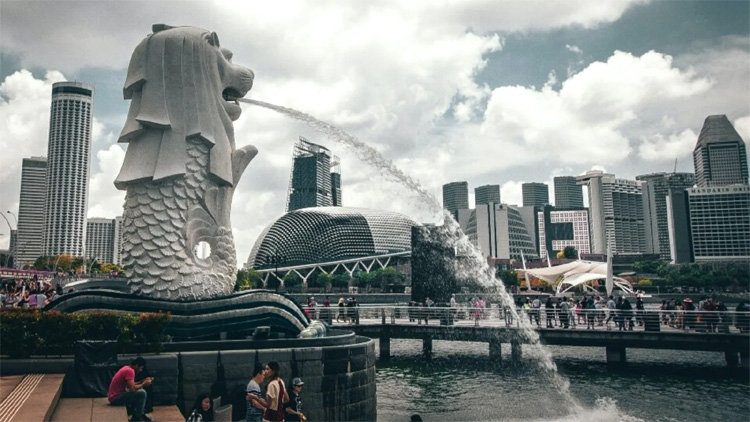How many Indians have visited Singapore so far in 2023? 3.5 times pre-Covid count
Last week, the Singapore Tourism Board (STB) announced visitor numbers to the city-state which topped expectations with over 2.9 million arrivals in the first three months of this year.
This is 62 per cent of 2019’s first quarter figure of the 4.7 million people who visited Singapore in the first quarter of 2019.
A total of 1,93,230 of these came from India which is about 3.5 times more than the 54,530 who arrived in 2022. Indian residents are the fourth largest source of tourist arrivals in the first quarter after Indonesians (5,23,300), Malaysian (2,78,910) and Australians (2,65,730). Americans made up the fifth largest group of visitors by country of origin at 1,68,960.
China which was the largest source of tourists for Singapore with over 3.75 million visitors in 2019 have yet to fully return to Singapore and made up the ninth largest group of tourists in Q1 with only 124,560 coming to Singapore.
In 2019, based on figures from China’s National Bureau of Statistics, Chinese tourists made nearly 170 million trips abroad.
Although China has lifted travel restrictions, cumbersome travel processes targeted at Chinese residents by countries like South Korea and Japan earlier this year dampened the enthusiasm for outboard travel.
This has been exacerbated by delays in passport renewals and visa applications as well as the inability of Chinese airlines to mount the same number of flights as before Covid. Based on data from Alibaba-owned travel booking site Fliggy, during February, international flights out of China are at less than 10 per cent of 2019 levels.
Furthermore, the travel habits of Chinese citizens have been changed by three years of Covid-19 restrictions with many now contented to explore the vast and varied attractions in their own country.
“The Chinese tourists we will welcome this year and in the coming years are very different from those who came before,” Wolfgang Georg Arlt, founder and chief executive of COTRI (Chinese Outbound Tourism Research Institute), was quoted by CBNC as saying at ITB Berlin, the world’s largest tourism trade fair. COTRI is an independent consulting company based in Germany.
In China as elsewhere, years of pandemic-induced lockdowns sparked a shift away from major tourist attractions toward “more nature-orientated, more outdoor-orientated tourism,” Arlt said. He highlighted the emergence of trends like camping and glamping, as well as family-focused trips.
COTRI predicts that Chinese outbound travel will recover to around two-thirds of 2019’s figures, with around 110 million overseas trips this year.
In the meantime, the Singapore Tourism Board is not waiting for Chinese tourists’ return to launch new activities and attractions to boost tourism on the island.
To inspire travel to Singapore through TV series and films, STB together with the Infocomm Media Development Authority (IMDA) announced the launch of an SGD 10 million (USD 7.5 million) Singapore On-screen Fund. The fund aims to support international media and entertainment (M&E) partners in marketing Singapore through television and film shows aimed at an international audience.
The Singapore On-screen Fund will support selected projects by key M&E companies, which must be set in Singapore and launched before the first quarter of 2027. Successful projects will receive funding support of up to 30 per cent of qualifying costs related to featuring Singapore, including production and marketing costs.
This is in part inspired by past collaborations which resulted in movies such as “Crazy Rich Asians”, the popular K-drama “Little Women (2022) and the HBO sci-fi hit series “Westworld Season 3” (2020). These shows created an international impact and left a positive impression on audiences around the world.
Also just announced in April is the return of the Free Singapore Tour which is very popular with Indian tourists as well as those from Australia and Indonesia. The tour was suspended during COVID. This tour is organised by STB together with Changi Airport and is meant for transit passengers at Changi who have a layover period of at least five and a half hours but less than 24 hours. They must also have valid entry visas for Singapore to take part in the tours.
The objective of organising these free tours is to entice transit passengers to make Singapore a destination for their next holiday.
The original three tours available before Covid- the City Sights Tour, Heritage Tour and Jewel Tour – have been refreshed to include new points of interest. A brand-new Changi Precinct tour will introduce travellers to the interesting sights and sounds of the eastern region surrounding Singapore Changi Airport. Each tour lasts two and a half hours and will be available daily, with plans to progressively increase to nine tours a day.
In 2019, over 80,000 passengers went on the Free Singapore Tour.
Another exciting development is the stationing of a brand-new Disney Cruise Line ship in Singapore from 2025 for five years. A memorandum of understanding between STB and Disney Cruise Line was announced on March 29.
The 208,000 gross-ton ship which will have a passenger capacity of about 6,000 plus a crew strength of 2,300 will be taking passengers for cruises around Southeast Asian countries, home to more than 40 UNESCO World Heritage Sites.
The Disney Cruise Line ship has the potential to add millions of local and foreign cruise passengers during the five-year period, including fly-cruise passengers who arrive in Singapore by air. It is also expected to bring about significant spillover benefits for the wider economy.
“We look forward to welcoming the magic of Disney Cruise Line to Singapore in 2025,” said Keith Tan, Chief Executive of STB. “This is an important milestone for STB and reflects Disney Cruise Line’s strong confidence in Singapore and Southeast Asia. The new Disney cruise ship will be an attraction itself and is expected to boost the tourism sector in Singapore for many years to come.”

